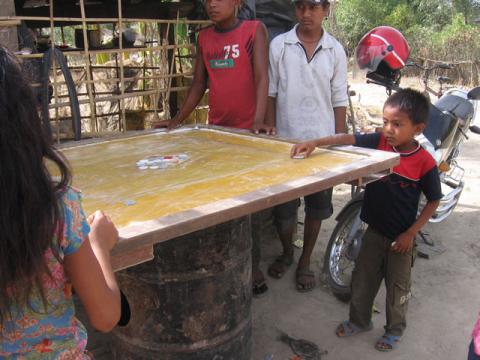Helping children fight malnutrition

Tul Prashad Chaudhary, 6, was once a severely malnourished and pitifully fragile child. Two years later, he is happy and healthy child, whose parents now know about child nutrition, hygiene and care.
Tul is the youngest son of Gurilal and Sunita Chaudhary. Gurilal, 39, works in a mill and his wife, Sunita 37, struggles between finding a day-job and her domestic chores. They both are illiterate.
Tul with his parents, an elder sister and brother live in Shreepur Village Development Committee, in Hariya, Kailali District. Kailali district is situated in the far western region of Nepal.
Two years ago, severely malnourished Tul had frail arms and legs and under his stretched skin, his ribs could be clearly seen. His mother’s attention made him upset and Sunita’s once nearly lost him to jaundice too.
Sunita says, “I did not know what was wrong with him. He was becoming weaker by the day. I was so worried to see him sick all the time. His head was bigger than his body. There was just no flesh. Sometimes, I used to just leave all my work and be with him. But, he didn’t have any appetite.”
Both Tul’s parents had to work to earn their bread and keep the other two in school. The last-born in the family, feeding and taking care of Tul was obviously not a priority. However, there were times when Sunita stayed home to be with him.
“We have a small land property where we grow maize, vegetables. Extreme weather conditions do not allow us to feed everyone round the year. So I also go to work as a farm labourer and I hardly had time to take care of Tul,” says Sunita.
Tul is among millions of children in Nepal who are malnourished. Disabling poverty, illiteracy and lack of awareness in this backward region have allowed children to suffer malnutrition, and in some cases untimely deaths.
Two years ago, when World Vision International Nepal (WVIN) Kailali Area Development Programme (ADP) entered Tul’s village, the situation was depressing. Out of the 120 children taken into WVIN sponsorship in Tul’s village, 60% of them were severely malnourished, Tul being one of them.
Tul’s involvement with WVIN enabled Sunita to become a member of the mothers group formed by WVIN Kailali ADP in the village. Kailali ADP supports monthly meetings among the mothers where Female Community Health Volunteers conduct teaching.
After a few sessions of sharing amongst the group of mothers, it became apparent that being illiterate, many mothers didn’t know much about proper childcare, nutrition, or sanitation.
Therefore FCHVs started classes on maternal and child health care, nutrition, safe delivery, immunisation, family planning, health and hygiene, and sanitation.
There Sunita and other mothers learned the importance of good nutrition and a balanced diet from locally-available grains. She also understood the value of safe ways of preparing and feeding food.
She says, “I didn’t know that I wasn’t feeding him properly. It’s not that we didn’t have food at home, but we never cared whether the food was clean or rotten. I didn’t know the difference it would make on children if they were not fed properly and timely. The classes also helped me understand the need of maintaining proper sanitation and hygiene at home.”
As Sunita practiced her learning at home, Tul started changing colour. She fed Tul with nutritious locally-available grains. She also maintained safe and healthy hygiene at home. Timely feeding and a balanced diet started doing wonders and Tul’s appetite gradually increased.
Every month a growth-monitoring programme is held in Tul's village and Sunita never fails to take Tul to it. Tul’s health has improved a lot and he’s become one healthy little boy.
Sunita says, “Tul’s weight has increased gradually. We are all happy to see our young boy running around. Although some of the nutritious food was available at home but I never knew it would work. I know that my ignorance and lack of knowledge would have lost him, but since I know now, my son is healthy, playing and dirtying his clothes.”
Purna Bahadur Nepali, Child Sponsorship Coordinator, WVIN Kailali ADP, says, “In remote villages like Tul’s, marginalised people have less access to information. The children here suffer malnutrition only because their parents are unaware of many health and nutrition issues. However, in two years, things have changed gradually. WVIN-supported mothers’ group sessions have helped children overcome malnutrition and so many are out of danger now.”
Once inactive, frail and listless, Tul now goes to school and is in grade two. Outside school, he’s found busy playing carom with the older boys in his village. Tul is hale, hearty and happy and so is his family.
He says, “I love going to school. School is more fun than staying home.”